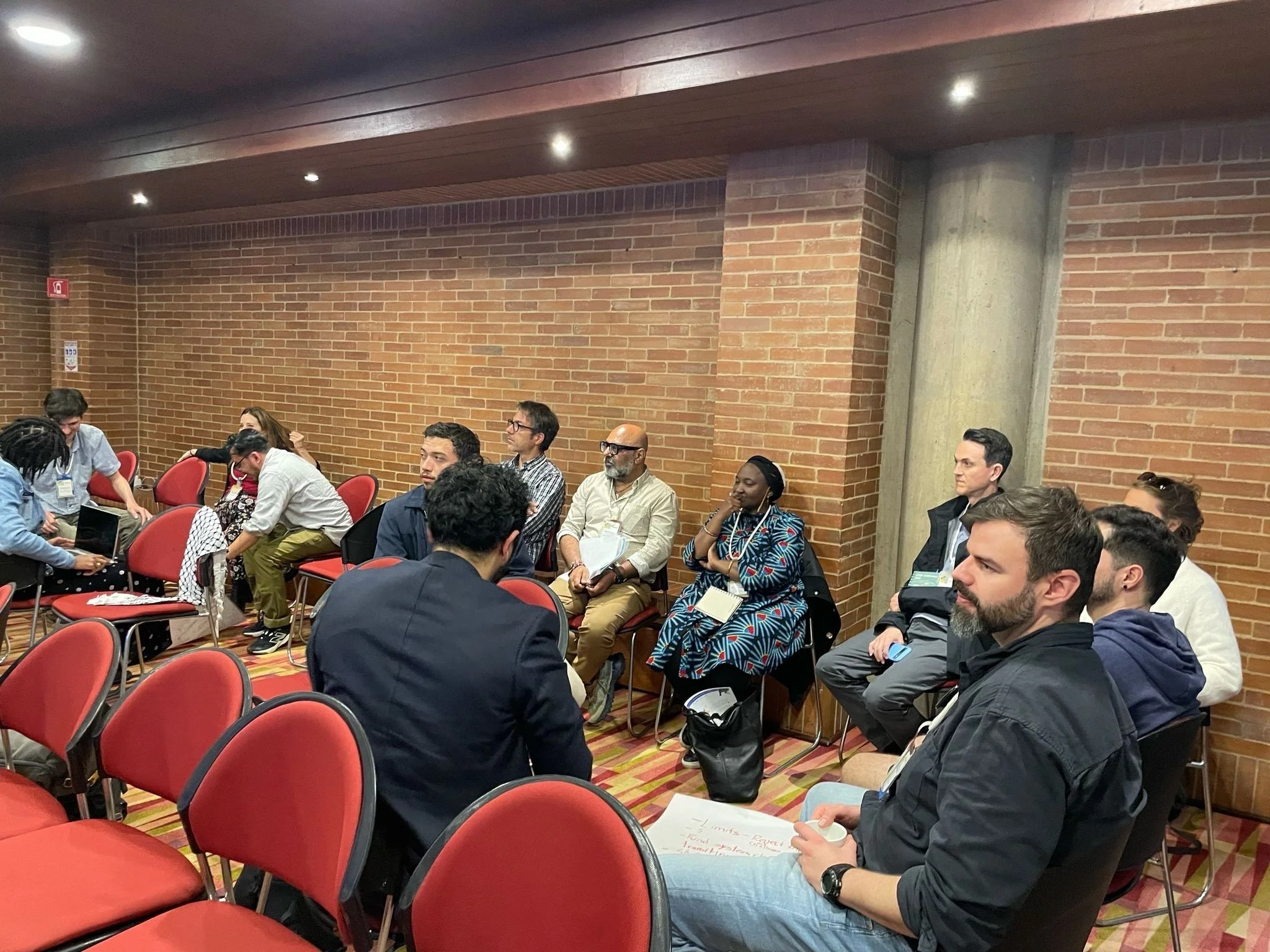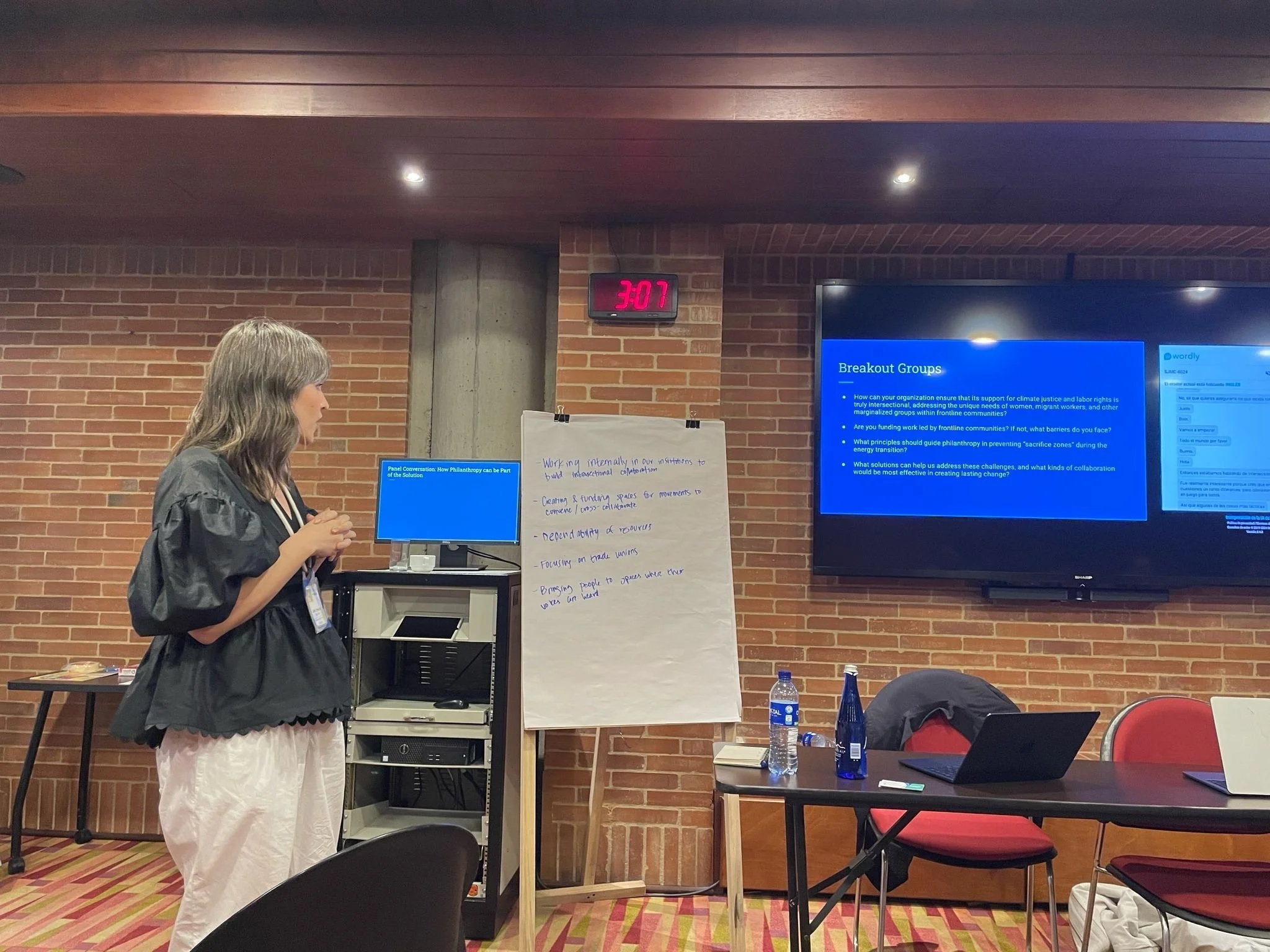May 21, 2025
A Just Energy Transition Starts with Workers: The Responsibility of Philanthropy
By Elias Hakim, Program Associate
The FORGE Secretariat had the opportunity to attend this year’s EDGE Funders Alliance Conference in Bogota, Colombia, From Pledge to Action: Accountability in Philanthropy.
I’m excited to share that the session we organized, A Just Energy Transition Starts with Workers: The Responsibility of Philanthropy, was a huge success! Over 20 conference attendees participated in our session, including funders and movement leaders, to hear from our panel and have a fruitful discussion on how philanthropy can be better partners to movements and to support the workers and communities driving the fight for a just energy transition.
Our panel conversation featured FORGE members and Democracy at Work Fund Grantees:
Abu Mufakhir, Sembada Bersama (DAWF Grantee), Coordinator
Mario Bernal, Partnerships and Resource Mobilization Officer, Fundación Avina
Maritza Silva-Farrell, Future of Worker(ers) Program Officer, Ford Foundation
Jana Morgan, Executive Director, FORGE (Moderator)
Jana started us off with a reminder of what is at stake:
Informal workers are already feeling the worst impacts of climate change. The challenges for women workers are particularly stark, as the climate crisis deepens issues like gender-based violence and harassment, and increases the burden of care. In the race to decarbonize, communities in the Global Majority are being treated as “sacrifice zones,” areas where residents are exposed to dangerous levels of pollution and hazardous materials, in order to mine and refine minerals critical to the transition. A just transition must center people, rights, and dignity - not expediency or purely technical solutions - and no community should be treated as expendable.
In our panel conversation, Maritza provided some important context on the origin of the just transition framework from the labor space, emphasizing that we must view this as an economic transition as well as an energy transition. Philanthropy can play an important role in connecting movements and cutting across silos. For example, Ford is currently supporting an effort from the ITUC in Africa for unions to collaborate with community orgs on climate solutions.
Mario emphasized the differences between how a “just” transition is viewed in the Global North vs the Global South. While the North is focused on the transition to ‘clean’ energy, the materials needed to fuel that transition are coming from the Global South’s land and labor. At the same time, countries in the Global South have contributed the least to climate change but are the most subject to feeling its impacts. Now is a time of great opportunity for systems changes, and it is critical for philanthropy to engage in collaborative efforts and share our learnings to maximize our ability to support real change.
Abu’s presentation was extremely compelling. He noted that Indonesia - with the biggest lithium reserve in the world and as the biggest producer of nickel - is the sacrifice zone spoken of. Worker safety is a huge issue, with over 111 workers dying on site from 107 accidents from 2019-2025. These numbers are highly underreported and don’t include injuries or workers that later died in the hospital. Workers and people in the nearby villages experience lung disease and upper respiratory infections from exposure to the polluted air from the refineries. He emphasized the support most needed from philanthropy is for additional monitoring and research, and that more funding was especially needed for long term organizing work.
Daniel Machado Gaio, National Secretary for the Environment (DAWF Grantee) from CUT-Brazil, was originally scheduled to join us but was unable to attend. In lieu of this, CUT Brazil shared a compelling video that we streamed during the panel highlighting their amazing work and emphasizing the role that unions must play in driving a just transition in the Brazilian context.
Breakout groups self-organized around the following key questions and shared their takeaways.
How can your organization ensure that its support for climate justice and labor rights is truly intersectional, addressing the unique needs of women, migrant workers, and other marginalized groups within frontline communities?
Philanthropy must bridge divides by creating and funding spaces for movements to convene and cross-collaborate. We must also bring movements into decision-making fora and spaces where their voices need to be heard.
We must increase flexible and long-term funding to create dependable resources for movements. Philanthropy must also be realistic about the pace of change and not expect miracles after only a year or two of funding. Changemaking is a long-term investment.
Funders need to support trade unions and other forms of labor organizing in fighting for heat protections and climate solutions.
Are you funding work led by frontline communities? If not, what barriers do you face? [Note, only moved leaders discussed this question]
Funders can face barriers working with unions. Managing centralized union bureaucracy can make it difficult to reach rank and file workers.
Powerful companies with challenging legal systems can create obstacles to labor organizing and intimidate funders from supporting organizing efforts. Funders must be brave, and be willing to fund innovative and nascent forms of organizing, including supporting informal workers.
What principles should guide philanthropy in preventing “sacrifice zones” during the energy transition?
Funders must outright reject the idea of sacrifice zones, and must challenge this concept whenever and wherever we see it.
Philanthropy must shift the lens from focusing on carbon and the energy aspect of the just transition, and instead prioritize economic system transition as a key component to the energy transition and tackling climate change.
Funders must have a positive vision of power - how can we use our influence for good, foster collaboration, and use our power to create positive change?
In their final thoughts, Abu emphasized the need for increased core funding for organizing work, rather than project-restricted, and - importantly - an understanding from philanthropy that change takes time. Maritza highlighted the Democracy at Work fund as an example of pooled funds we can create at intersections of labor and the energy transition. Mario finished with a message that philanthropy must change our perspective. Some funders may view communities and unions as the beneficiaries of the just transition, but they are actually the ones driving it.
Jana’s closing remarks invited funders to fund intersectionally, strategically, and long term, with an embrace of participatory grantmaking and accountability principles. We must trust the movements we support, understand how they work, and hire people from movements into philanthropy to truly understand the movement landscape.



